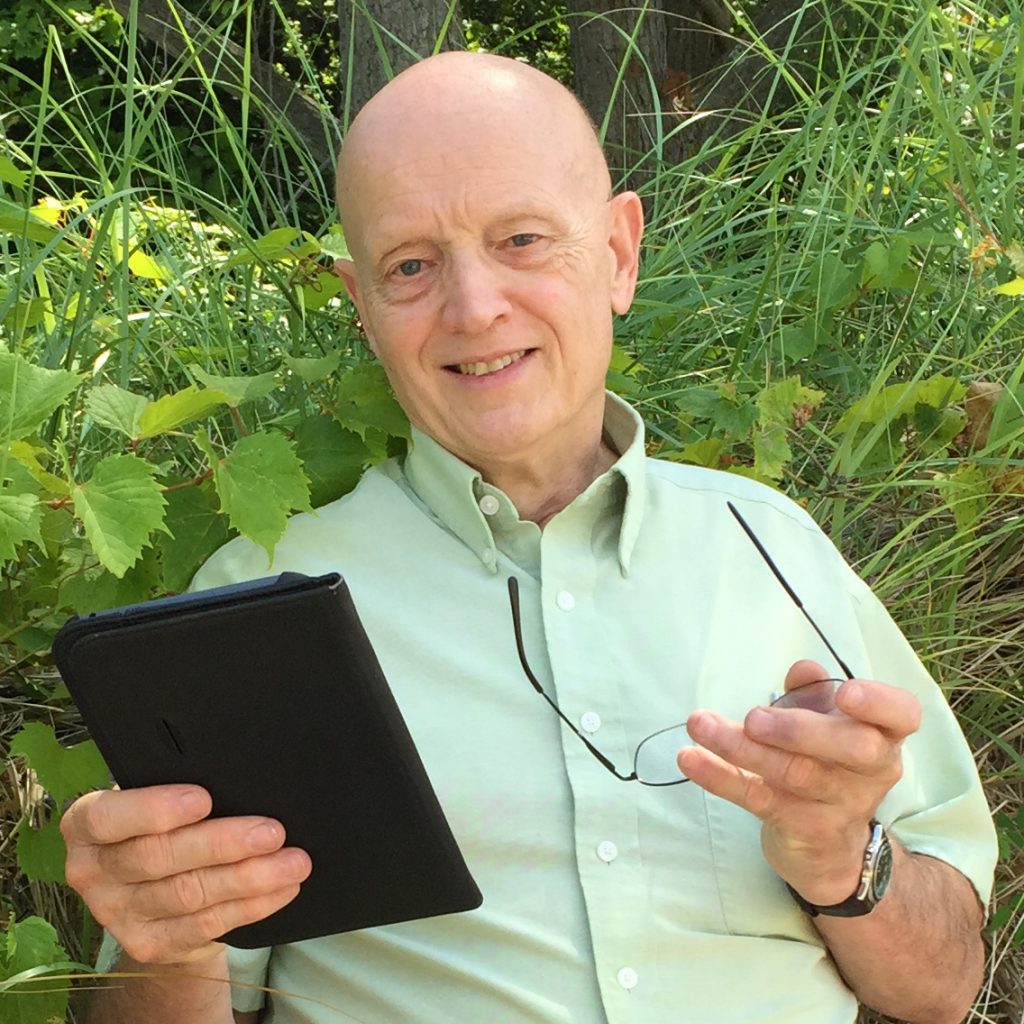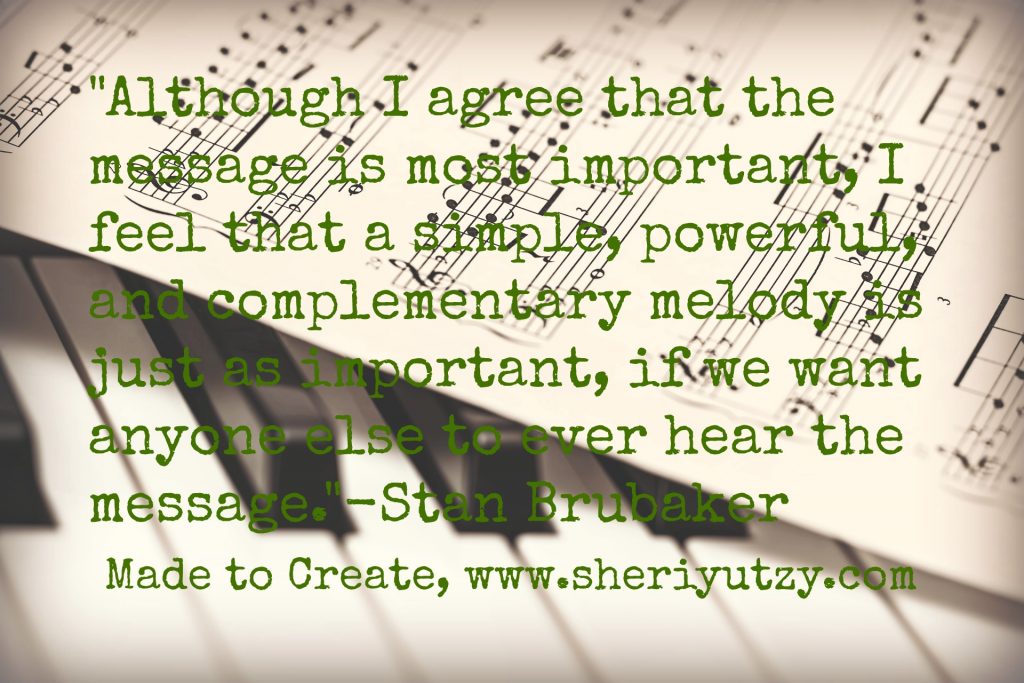
Made to Create interviews begin again, finally!
For this month’s interview, I’m delighted to introduce Stan Brubaker, a published song-writer and author of Canticles of Au-Royalia, a Christian fantasy novel. Stan has been a school-teacher, a pastor, a printer and publisher, and always a wordsmith. You can find out more about Stan’s work at www.stanbrubaker.com or on his YouTube channel.
Sheri Yutzy: Hello Stan, welcome to Made to Create.
Stan Brubaker: Thank you, Sheri, it’s a pleasure to talk to you. And, before I forget, I like your phrase “Made to Create.” I don’t think our eternal purpose is to just take up space on the earth!
Sheri: I agree! Let’s start at the beginning of your creative journey. Can you name an event that started your interest in writing and composing music?
Stan: I remember my first experience with thrilling, acapella, four-part harmony, when as a very small boy I crept out to the top of the stairs and heard my parents and another couple practicing songs for a wedding. I was raptured by the beauty, and have never lost the wonder of what music can do in our hearts.
In later years, my grandfather taught me some science about music harmonics and solfege music, and a number of us (brothers and cousins) played guitars together.
Sheri: I’ll focus on songwriting for now. What habits and disciplines are important to you when you’re writing?
Stan: You know, Sheri, I have almost never just sat down to compose a song, unless someone wanted new words for a favorite tune, or something like that. My best songs are just given to me from the Lord, I believe— sometimes after emotionally special circumstances, or more often when I’m driving, or maybe lying down to take a 15-minute nap.
Most of my best songs (dozens, like “Teach Me, O Lord, to Number My Days” for example) came to me quite quickly, words and music together, sometimes in a short period of time, perhaps an hour or so. The discipline then is in devoting time later to crafting the music and lyrics by pruning, rearranging, praying, playing the chords— maybe adding a verse, or combining some— and letting time further develop the vision of the song. My musical cook-stove has a LOT of ‘back burners’ with various songs slowly cooking, evaporating, or going up in flames!
Sheri: How does your writing impact your music, and vice versa?
Stan: On rare occasions I may compose a melody I really like, but without words, as has happened a few times recently when I was inspired by a new combination of instruments on my Lowrey organ.
When that happens I play through it prayerfully many times to hear ‘what it is really saying’ before I would dare marry any words to it. Although I agree that the message is most important, I feel that a simple, powerful, and complementary melody is just as important, if we want anyone else to ever hear the message.
Since I hardly ever start with words, and add music later, I can’t share much on that, but it would be a similar process. And I suspect that anytime we apply ourselves diligently to anything— whether it’s learning a new language, or how to sew or take better photos, or ANYTHING— it will help us in many parallel ways elsewhere.
 Sheri: Yes, I’ve found that to be true in my life. What are two books and two albums you’ve been inspired by?
Sheri: Yes, I’ve found that to be true in my life. What are two books and two albums you’ve been inspired by?
Stan: For a number of years my wife Janice and I have been reading through the Bible every year using the “One Year Bible” and I frequently find new insights and inspiration doing so. We have them (in print books) in five different versions, but usually read every morning on our iPhones.
Other favorites? The Michael Phillips-edited novels by George MacDonald (whom C.S.Lewis claimed as the mentor who baptized his imagination) have taught me much about the poetical God-heart; books by Phillip Keller taught me the beauty of natural alliteration, and practical spirituality.
Albums? Hardly any single collection stands out. I love simple hymns done well on flute, sax, harp, etc., and quality singing and choral music if it “goes somewhere” and doesn’t stray too far from worthy purpose.
Sheri: I like the idea of music “going somewhere.” Well put. If you could be fulfilling any creative goal in five years, what would it be?
Stan: Well… I have been thinking the last several months about a new project: printing a series of ‘pocket-size’ songbooks for youth, with a really neat feature I won’t disclose yet. I’ve had 120 songs typeset for the first two books, but it’s still really in the testing and marketing stage.
I’ve also been slowly learning to make YouTube videos of some of my songs. They’re not professional enough yet to satisfy me, but they’re slowly improving, and I hope they can bless others like they have me.
And, I would love to get 5-8 young people together for a few days once or twice a year, to work on songs together— a way to ‘pass on the torch’ to those with serious talent and commitment.
Sheri: What is one piece of advice you’d give to someone wanting to use their creativity to worship God?
Stan: Sheri, I believe music was not “created by” God, like we may tend to think, but has always existed as an important part of God’s own amazing divine nature.
I am absolutely astonished at how much of Himself God has put within us, so I think we should give back to Him our very best. How?
Don’t let well-meaning people discourage you. Avoid the distractions of pride and false humility by giving yourself fully unto God. I remember playing a song in my recording room once, and being convicted that I was not “singing unto the Lord” as we are commanded so many times in Scripture. I was thinking more about how it would sound to others.
Each of us is a unique individual showing a bit of God’s grandeur, and we are to develop the gifts we have— not bury them in the earth— and will answer someday to our Creator for our motives and output.
For me that means listening to the Lord: I may be writing a deeper ‘spiritual’ hymn, a gospel song, a lullaby, or even a ‘folk song’ or love song, but the vital question is always, “What are You saying, Lord? What do You want this to be, to give You glory?”
I suspect that we sometimes take pride in our ‘work ethic’ about material things, but shrink back (under false humility) from even-more-important ‘spiritual’ gifts and activities.
And, to become good at anything we obviously need to invest time and effort, giving it some priority.
When I was in my 20s, and interested in writing for children (several years before we started publishing “Nature Friend Magazine“) I drove to the local library, picked out the most interesting children’s nature books I could find, read through them, and listed on paper all the notable action verbs, like flashed, danced, blazed, scurried, and twirled. It really opened my eyes to the joy of using quality words in terse writing, as opposed to just lazying along with “said, went, did, looked, and stood and said again.”
I have also taken time to analyze some of our simplest and most popular songs, ones like Jesus Loves Me, How Great Thou Art, and Silent Night. See the link below, if you want to hear it in over 100 languages, and there’s also a link to a blog article, where I gave my two bits about why the hymn Silent Night is so worthy of its popularity.
When I wrote my Christian ‘fantasy’ book a few years ago, I was amazed at how much easier the writing of a full-length book flowed, because of my hundreds of hours through the years spent in ‘close-crafting’ little verses of poetry in music.
Since we are “Made to Create” I thank you for this opportunity to encourage your followers to jump into worshiping God with all their heart, and to use their many gifts to bless others, as unto the Lord— Blessings!
Sheri: Blessings to you as well, Stan! Thank you for sharing your heart.
Silent Night in 143 languages.
Find Stan’s article analyzing the hymn Silent Night here.
Find Stan’s Christian fantasy eBook, Canticles of Au-Royalia on Amazon.